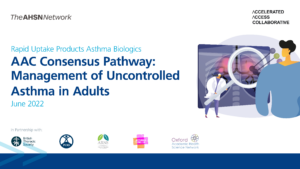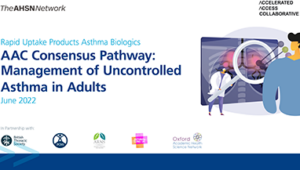A new set of standards based on best practice aims to lead to better care for adults with uncontrolled and severe asthma. The consensus pathway was created by the NHS Accelerated Access Collaborative (AAC) Rapid Uptake Products (RUP) asthma biologics programme which is led by the Oxford AHSN on behalf of the AHSN Network.
Up to 200,000 people in the UK have uncontrolled and severe asthma which has a significant impact on their quality of life. Many are frequently admitted to hospital as an emergency and run the risk of serious side-effects from extended periods on high dose steroid-based medication. Current service provision is patchy, characterised by lengthy waits and wide variations.
Emerging biologic therapies offer better outcomes for large numbers of these people – but very few are receiving them.
Improving outcomes for patients with respiratory disease is one of the clinical priorities in the NHS Long Term Plan. The AAC RUP asthma biologics programme is supporting improvements in pathways and practices to ensure more patients receive timely specialist care.
 The consensus pathway for managing uncontrolled asthma is intended to be a blueprint, guiding clinicians, managers and commissioners on what optimal care should look like across the entire patient journey and leading to real improvements in outcomes.
The consensus pathway for managing uncontrolled asthma is intended to be a blueprint, guiding clinicians, managers and commissioners on what optimal care should look like across the entire patient journey and leading to real improvements in outcomes.
The consensus pathway was launched at the NHS ConfedExpo on 16 June 2022 where Oxford/Wessex Academic Health Science Networks delivered a session at the AHSN Network Innovation Zone on ‘Transforming asthma care through system-wide collaboration and innovation’.
Professor Andrew Menzies-Gow, National Director for Respiratory Services, NHS England/Improvement, said: “I have seen how biologics can transform the lives of people with severe asthma and this pathway is an important step in optimising access for people who will benefit from them.”
Professor Gary Ford, Chief Executive, Oxford AHSN and Chair of the national AHSN Network said: “This consensus pathway will support our NHS partners to improve care for people with uncontrolled and severe asthma. By continuing to work together, we will ensure that more people with severe asthma are able to access high quality care and benefit from life-changing treatment.”
Dr Hitasha Rupani, Pathway Lead and Clinical Champion for asthma biologics based at University Hospital, Southampton, said: “I hope the consensus pathway will shape discussions and guide the development of asthma pathways at a local and regional level.”
Asthma patient Jo Beechcroft said: “The freedom I got from biologic therapies both physically and mentally was amazing.”


